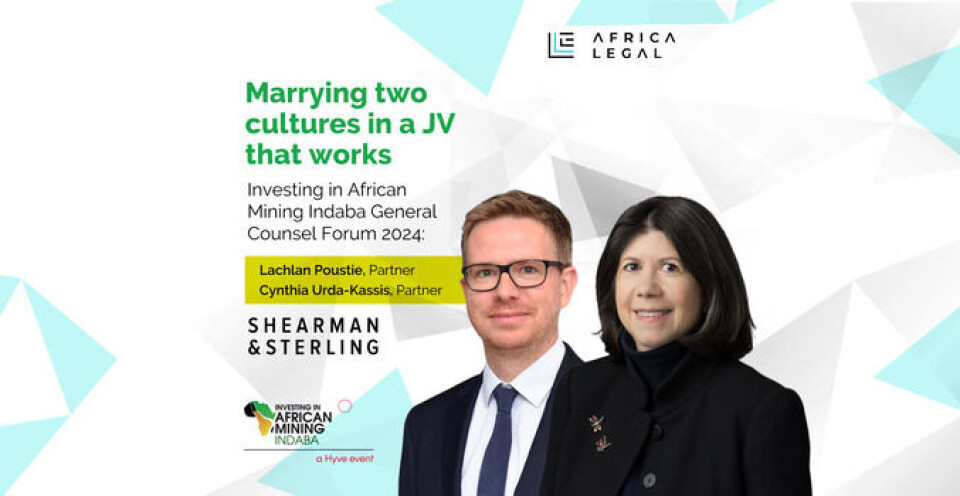Speaking at the 2024 General Counsel Forum which rounded off the Investing in African Mining Indaba in Cape Town in early February, Cynthia Urda Kassis and Lachlan Poustie, both partners at Shearman & Sterling, took a closer look at the rise of these kinds of joint ventures and some of the lessons they have learned from bringing together these very different cultures.
Poustie and Urda Kassis explained that the two entities are now coming together more and more often to develop new mines and technology that will benefit both of them, but some unusual issues come up when you’re working with companies that have totally different end goals and ways of working. General counsel need to be aware of the potential pitfalls which arise from these unusual issues, and take those into consideration when advising their clients.
Poustie pointed out that OEMs get involved in these kinds of joint ventures for a number of reasons:
- To ensure certainty of supply of materials they need;
- As a form of cost-risk mitigation;
- To ensure the integrity of their supply chain; and
- To access certain incentives, especially in the USA.
He explained that mining companies have completely different reasons for getting involved. For them, OEM partnerships serve as:
- A form of project validation, especially for smaller mining companies because they can announce that a well-respected OEM has partnered with them;
- A means of getting early-stage funding;
- A way to mobilise feasibility stage funding from multiple sources;
- A form of demand-risk mitigation because they know they have a committed (or likely) buyer for their product; and
- A potential price-risk mitigation.
Urda Kassis told attendees at the GC Forum that when they’re drawing up contracts in joint ventures like this, lawyers need to be aware that although the OEM may be a large equity holder, their thinking will likely be very different to that of the mining company and other equity holders in the company, and their decisions may be made as a customer, not as a shareholder.
The mining company will also need to keep in mind that the OEM doesn’t know how much of the mined materials it will want and when, so their offtake may vary and is typically not a predictable set arrangement, but has significant flexibility built into it. Lawyers and mine company management also need to be aware that the two entities operate in very different environments, with the automotive manufacturing industry being very structured and stable, while mining companies have many more ups and downs and changes.
“The GC’s role is very important in structuring key pillars of the joint venture relationship,” said Urda Kassis, noting that as business people with a legal background, GC need to act as a bridge between the two cultures. She added that the GC needs to weigh in on whose policy on environmental, labour and safety issues will be followed. “You can’t just say ‘Sorry, we’re using ours’, you have to have something that’s practical and that preserves what’s important for both entities. For example, the OEM may have to comply with labour legislation from their home country, so you’ll have to include that.”
Poustie noted that OEMs also often try to impose their ESG requirements on suppliers, whereas mining companies justifiably think they know better how to run mines and how to manage the ESG issues in that environment, so the GC will need to help negotiate a compromise.
He shared that incentives are now playing a huge role in the automotive industry, with OEMs having to pay attention to where their raw materials are coming from and where their products are manufactured, hence their desire to have a ready supply from a company in which they have some say.
Hosted by Africa Legal, this year the GC Forum was sponsored jointly by Three Crowns LLP, Shearman & Sterling and the GREAT Legal Services campaign.
To join Africa Legal's mailing list please click here

